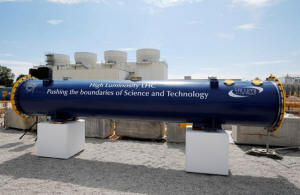|
Revamped collider to shine brighter light
on physics mysteries at CERN
 Send a link to a friend
Send a link to a friend
 [June 16, 2018]
By Tom Miles [June 16, 2018]
By Tom Miles
GENEVA (Reuters) - Europe's physics
research center CERN launched an upgrade of its Large Hadron Collider
(LHC) on Friday, six years after the huge particle accelerator solved an
enduring riddle by confirming the existence of the elusive Higgs boson.
Staff said the overhaul will boost the "luminosity" of proton-smashing
experiments at the LHC, a 27-km (17-mile) ring under the Swiss-French
border, increasing the number of particle collisions tenfold and
producing a clearer picture of the sub-atomic world.
"This will allow us to address new questions, the outstanding questions
in fundamental physics, with more opportunity to find answers," CERN
Director-General Fabiola Gianotti told Reuters at the opening ceremony.
The decade-long upgrade, involving a materials budget of 950 million
Swiss francs ($953 million), will allow the LHC to churn out more data
about particle collisions every year than it has since its working life
began in 2010, experts there said.
The upgrade will focus the beams of the protons that are smashed
together - increasing luminosity - meaning more collisions and more
chance of spotting something unusual.

Last year the LHC produced about 3 million Higgs bosons, the long-sought
particle which, along with an associated forcefield, provided the answer
to the question: where does matter get its mass from?
After the upgrade, CERN said the LHC will be producing at least 15
million Higgs bosons per year, allowing physicists to get better
acquainted with one of their most recent discoveries.
They will also be seeking other particles, and looking for answers about
anti-matter and the Big Bang at the start of the universe.
Gianotti said her hope was that the upgrade - akin to replacing your
dingy 60-watt bedside lamp with an industrial floodlight - would provide
answers about "dark matter", which has never been seen but is known to
exist because of its effect on the visible material around it.
[to top of second column]
|

A magnet is pictured after a ceremony to launch the civil
engineering works for the High Luminosity LHC Project (HL-LHC) at
the European Organization for Nuclear Research (CERN) in Meyrin near
Geneva, Switzerland June 15, 2018. REUTERS/Denis Balibouse

"For me personally, solving the mystery of the dark matter of the
universe would be something great," she said. "Of course it would be
fantastic to produce the dark matter particle in the collision of
LHC beams."
The value of the discoveries cannot be predicted, but they are
expected to provide a boost to science and technology in future,
potentially speeding up manufacturing processes or improving
computing power.
Even the technologies needed to upgrade the LHC will break new
ground, because focusing the proton beams that are smashed together
will require new super-conducting magnets and electronics that have
never been developed before, with potential spin-off benefits for
society, Gianotti said.
Another unknown is whether the upgrade could bring more Nobel prizes
for physics, which Peter Higgs and Francois Englert won in 2013 when
the LHC vindicated their 50-year-old theory of a missing boson.
"We will see," said Gianotti. "We’re in the hands of nature."
($1 = 0.9968 Swiss francs)
(Reporting by Tom Miles; Editing by Andrew Heavens)
[© 2018 Thomson Reuters. All rights
reserved.]
Copyright 2018 Reuters. All rights reserved. This material may not be published,
broadcast, rewritten or redistributed.
Thompson Reuters is solely responsible for this content.
 |